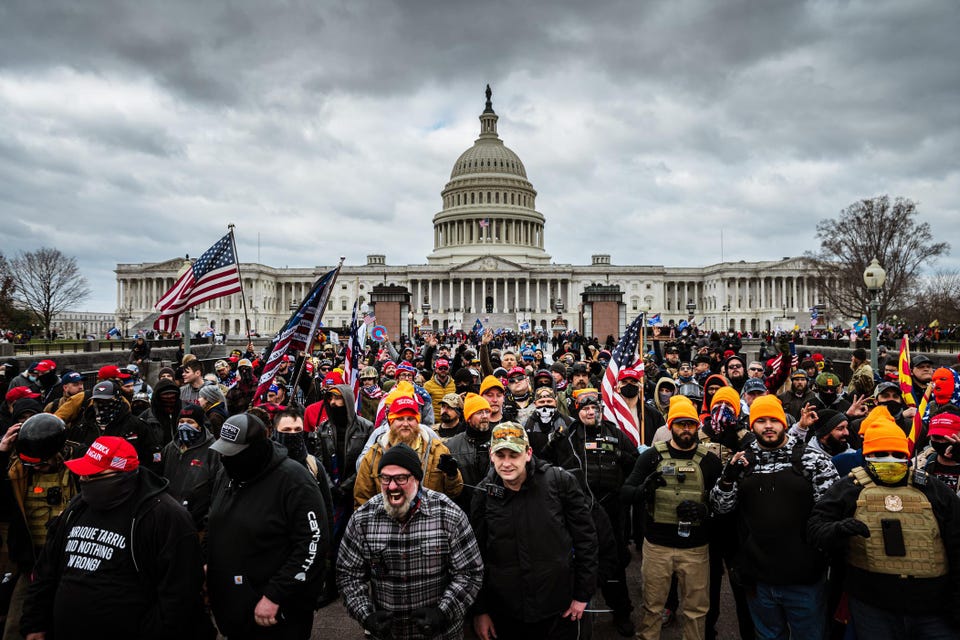Social Media Social Media Platforms And The Lessons Of January 6 Peter Suciu Contributor Opinions expressed by Forbes Contributors are their own. New! Follow this author to improve your content experience. Got it! Aug 1, 2022, 01:06pm EDT | New! Click on the conversation bubble to join the conversation Got it! Share to Facebook Share to Twitter Share to Linkedin WASHINGTON, DC – JANUARY 06: Pro-Trump protesters gather in front of the U.
S. Capitol Building on . .
. [+] January 6, 2021 in Washington, DC. A pro-Trump mob stormed the Capitol, breaking windows and clashing with police officers.
Trump supporters gathered in the nation’s capital today to protest the ratification of President-elect Joe Biden’s Electoral College victory over President Trump in the 2020 election. (Photo by Jon Cherry/Getty Images) Getty Images There remains a common misconception that social media is subject to First Amendment constraints. This is certainly not the case, and the platforms do not “censor” speech – as that is something only the government can do.
Instead, the platforms act in accordance to their editorial discretion. Yet, even that isn’t technically cut-and-dry. Due to the Section 230 immunity, as noted by Seth C.
Oranburg, associate professor of law, in an article for Duquesne University , the platforms are also allowed to exercise editorial discretion without incurring liability for third-party content (users’ tweets, posts, grams, videos, hashtags, threads, etc. ). Essentially that means the platforms are not liable for defamatory or inflammatory tweets posted by the respective users.
However, social media could still be seen as responsible in part for the January 6, 2021 Capitol riots, as those platforms were used as a communication tool – and the various networks did little to stop it. “Social media companies must know that one, actions have consequences; and two scale matters,” explained William V. Pelfrey, Jr.
, Ph. D. , a professor in the Wilder School of Government and Public Affairs at Virginia Commonwealth University.
“A person with 40 followers is very different from a person with a million followers,” Pelfrey said via an email. “Review and regulation efforts should be concordant with the possible implications of the post and the history of the person posting. Social media companies have an ethical responsibility to review the posts of persons with a problematic history and block, or quickly remove, dangerous posts.
January 6 should have taught the leaders of social media organizations that actions have consequences. Conversely, failing to act – or remove/block a post/tweet – also has consequences. Continued abrogation of ethical responsibilities to protect the public will likely lead to government regulation.
” MORE FOR YOU A New Clubhouse Feature Aims To Increase Small, Private Chats—And Deeper Engagement Facebook Admits It Reported Faulty Numbers To Advertisers, Blames Apple AOC’s ‘Tax The Rich Dress’ – Ultimate Fashion Statement Or Display Of Hypocrisy In fact, it could be argued that as it currently stands, social media platforms aren’t constrained by the First Amendment, yet, those same platforms have many of the protections guaranteed by it. “Users are free to post their own content and social media companies are simply the vehicle for that content,” Pelfrey continued. “If anyone posts a direct criminal threat, social media companies are expected to one, remove that post; and two, notify law enforcement.
For example, if a person posts ‘I’m bringing a knife to school tomorrow and I’m going to stab you’ that is a direct threat of violence necessitating law enforcement investigation and intervention. ” Yet, as we’ve seen in some recent mass shootings, such obvious “red flags” have largely gone unheeded or even ignored. Then there is the issue of what politicians and other “authority” figures often say on social media.
Often times this has been seen as hyperbole. The question is whether those types of comments need to be taken more seriously. “When someone, such as a high profile political leader, says ‘Voters must rise up, demand change, and cast off their oppressors,’ there is no imminent threat clearly expressed,” added Pelfrey.
“One could reasonably interpret that as a call to political action. If one is so inclined, they could also interpret that as a call to violent action. Social media companies are expected to self-regulate and they all have policies stating what posts/tweets are allowed and what is not.
These policies are subjective with questionable enforcement which is why some political leaders are considering imposing regulatory mechanisms on social media companies. ” The question is whether the social media platforms will actually react to these issues, or if it will be business as usual. Pelfrey said change could be coming, but only because the companies are forced to do so.
“Eventually, social media companies will likely be forced to change, either through government imposed mandates or as artifacts of liability,” he suggested. “Lawsuits against gun companies represent a viable analogy. It took years, and myriad lawsuits, but courts and juries are now holding gun companies responsible for misleading gun advertising.
Social media companies could find themselves at the wrong end of a lawsuit one day if they fail to act responsibly. ” Follow me on Twitter . Peter Suciu Editorial Standards Print Reprints & Permissions.
From: forbes
URL: https://www.forbes.com/sites/petersuciu/2022/08/01/social-media-platforms-and-the-lessons-of-january-6/



